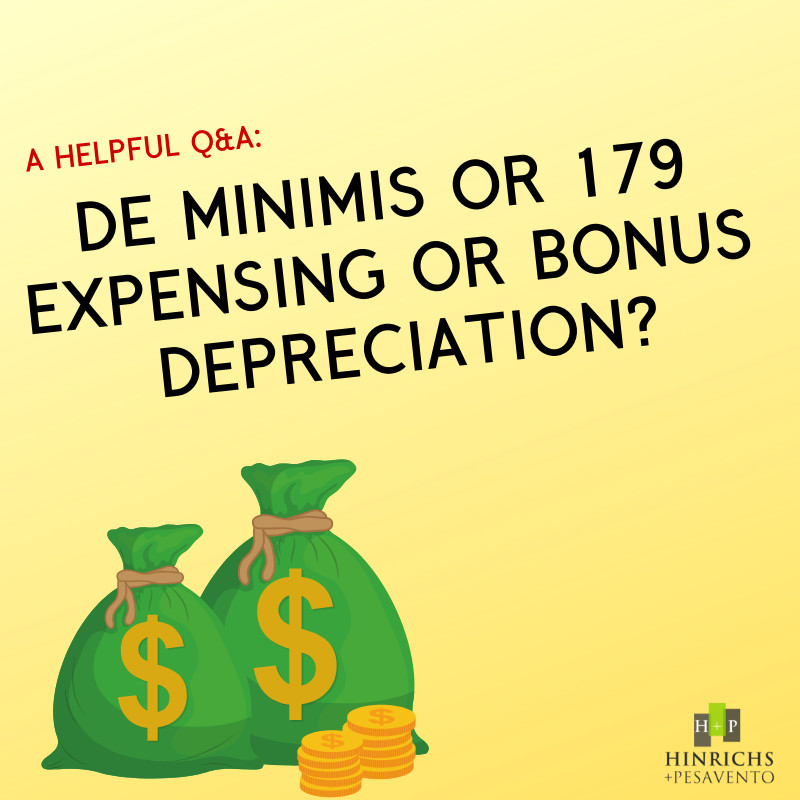A helpful Q&A: De Minimis or 179 Expensing or Bonus Depreciation?
Question: Does the new Tax Cuts and Jobs Act tax reform 100 percent bonus depreciation change your recommendation?
Answer: For federal income tax purposes, you’re better off using the new 100 percent bonus depreciation for your small asset purchases instead of the de minimis safe harbor election or Section 179 expensing. The de minimis safe harbor allows you to elect immediate expensing of small-asset purchases provided that:
- the asset costs $2,500 or less ($5,000 if the business has an applicable financial statement),
- you reflect the asset cost as an expense on your company’s books of account, and
- your financial accounting procedures follow the same expensing method you use for federal tax purposes.
Three Federal Income Tax Reasons
There are three federal income tax reasons why you should use 100 percent bonus depreciation instead of the de minimis safe harbor:
- When you sell property expensed under the de minimis safe harbor, the proceeds are ordinary income and, if you file your business return on Schedule C of your Form 1040, are subject to the self-employment tax. When you sell property for which you claimed 100 percent bonus depreciation, the proceeds are ordinary income to the extent of depreciation recapture, and any excess proceeds over the original basis are Section 1231 gain (generally capital gain). The sale of an asset that you expensed using bonus depreciation does not trigger the self-employment tax.
- If you use the de minimis safe harbor, you have to attach the required election statement to your tax return or you lose your expensing.
- For purposes of the new 20 percent tax deduction under Section 199A, depreciable property might add to your qualified business income if your taxable income is equal to or over the $157,500 (single) or $315,000 (married, filing jointly) thresholds. Property for which you use bonus depreciation adds to your qualified property and can add to your Section 199A tax deduction. De mini mis expensing makes the property disappear from the property records and cannot add to your Section 199A tax deduction.
What about Section 179?
Section 179 expensing has one deficiency compared with bonus depreciation and de minimis expensing. It’s called recapture and it applies to Section 179 expensing when business use drops to 50 percent or less. De minimis expensing does not trigger recapture. Bonus depreciation on listed property, such as cars, trucks, airplanes, etc., triggers recapture when business use declines to 50 percent or less. The bonus depreciation “50 percent or less business-use recapture” rule does not apply to assets other than listed property. When triggered by the decline to 50 percent or less, recapture returns the excess tax deduction to the tax forms where you claimed the original deductions. For the Schedule C taxpayer, this is Schedule C, which means the recapture amount triggers both income and self-employment taxes. For the S or C corporation, the recapture triggers additional income, which:
- for the S corporation passes through to the owner as ordinary income, and
- for the C corporation creates more C corporation taxable income.
Local, County, and State Property Taxes
The assessment of property taxes by local, county, and state governments varies widely. Some jurisdictions look to the business’s income tax returns for property that’s subject to property taxes. De minimis expensing removes the expensed property from the tax returns. If your business is taxed based on the property listed on your federal income tax return, de minimis expensing may give you an advantage.
Takeaways
Before tax reform, the de minimis safe harbor election was the best way to immediately expense the entire cost of your small-business assets for federal income tax purposes.
Now that the Tax Cuts and Jobs Act tax reform gives you 100 percent bonus depreciation through 2022, you have three possible reasons to use 100 percent bonus depreciation as your federal income tax default expensing method:
- If you are filing Schedule C for your business activity, there is no self-employment tax on the sales proceeds.
- It’s an easy method. You face none of the de minimis rules.
- There are increased Section 199A deductions in certain cases.
Before deciding on the best method for federal tax purposes, make sure to check on how your selection will affect your state and property taxes, and what that does to your net savings.

